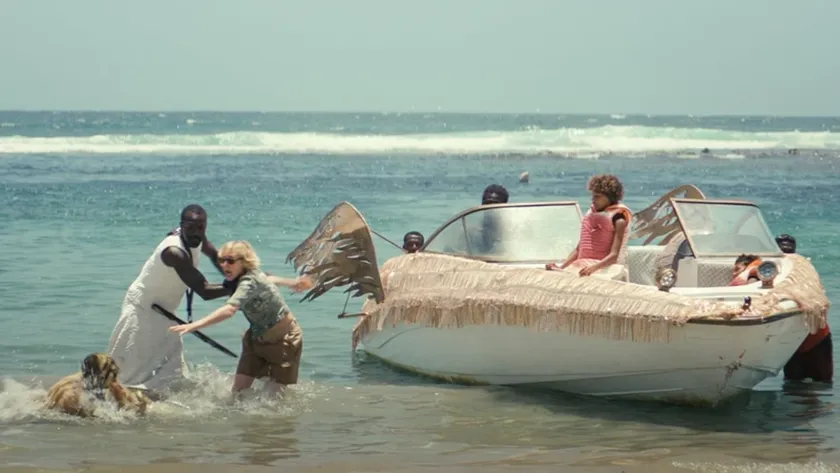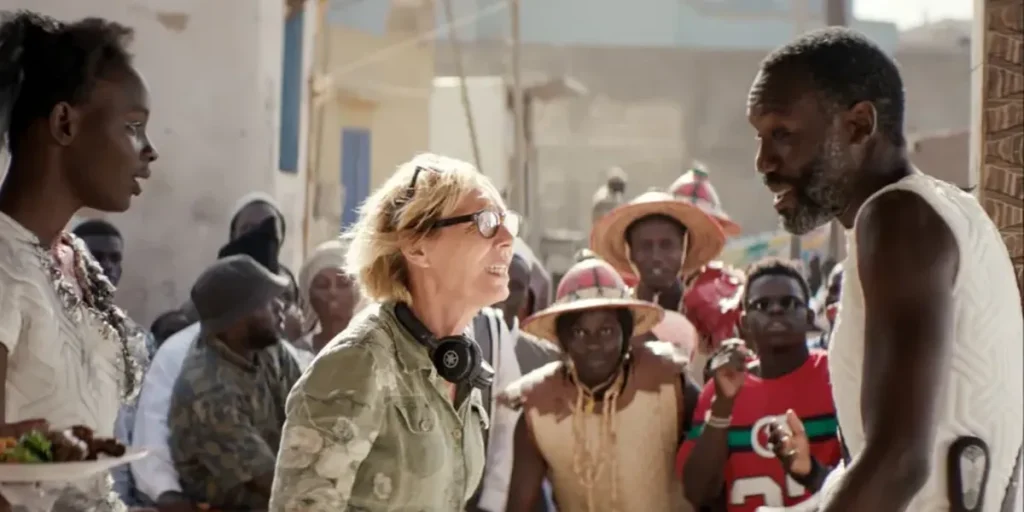Ulrich Köhler’s Gavagai is an anthropological study of race, culture and discrimination in the film industry through the eyes of an up-and-coming star.
Writer-Director: Ulrich Köhler
Genre: Drama
Run Time: 91′
New York Film Festival Screening: September 27, 2025 (World Premiere)
U.S. Release Date: TBA
U.K. Release Date: TBA
The “gavagai” problem was proposed by theoretical philosopher Willard Van Orman Quine in the 1960s. The concept centers around an individual visiting a place foreign to them, not understanding or speaking the language, witnessing a native say “gavagai” while a rabbit runs along. While the visitor might guess that “gavagai” means rabbit, without speaking the language, there is no way to know for sure that “gavagai” doesn’t mean “running” or “running rabbit” or “fast” or so on and so forth.
Over the years, the “gavagai” problem has been more colloquially used to describe a word in a foreign language that has no direct translation or whose meaning cannot be fully explained in a different language. In Ulrich Köhler’s 2025 anthropological feature, Gavagai, he explores the various ways in which the gavagai problem extends beyond language to impact race, culture and romance.
Köhler’s Gavagai revolves around an illustrious, yet highly neurotic, director attempting to modernize the Greek tragedy of Medea. Gavagai opens up in Senegal on the set of Medea, where the director, Caroline (Nathalie Richard, of After Love), gets into a physical altercation with lead actress Maja (Maren Eggert, of I’m Your Man). At this point in the filming process, the production is running on fumes, with Caroline still trying to find the story despite the shoot almost being over and Maja at her wits’ end, wanting to return home to her daughter.
The only saving grace of the shoot is the widely loved lead actor, Nourou (Jean-Christophe Folly, of Triangle of Sadness). Nourou, a Senegal native, is able to calm down Caroline, manage the rising tensions of the overworked cast and crew and provide a sense of sanity to Maja. During the shoot, Maja and Nourou develop a romantic relationship despite Maja having a partner she has grown distant from back in Germany. For Maja, Nourou is her escape on this chaotic set and foreign country.

The film jumps months later to Medea’s premiere at the Berlin International Film Festival. Nourou arrives at the hotel the festival has put him up at and is immediately met by a racist encounter with one of the hotel’s security members who demands to see his identification and proof of his stay. While the security guard says this is standard practice, Nourou, a Black man, is the only person he has repeatedly asked to see identification for.
When Maja arrives at the hotel to meet Nourou, she is furious and demands to speak with the hotel’s manager despite Nourou’s insistence that they put the issue to rest. This incident places a wedge between these two lovers who were initially excited to reconnect but now cannot avoid the real world that seemed not to exist when their affair began on set.
As the days of the festival leading up to the film’s premiere proceed, Nourou is forced to play into the politics of the film industry despite cards being stacked against him and no one around him understanding the difficulties of existing in a space that has historically actively worked to exclude you.
Gavagai brilliantly sets out to paint a contemporary drama against the backdrop of an ancient tragedy. It looks at themes of origin, race and culture through a lens that both allows its audience to see the humour in the absurdity of people’s ignorance and understand the heartbreak of not being able to find solace and community in a world you so badly want to be a part of.
When Nourou is in Senegal, where he grew up, he serves as the heart of the film’s production. His family is able to work on the shoot, he seems to be the only person who can get through to Caroline and his relationship with Maja is balanced by both respect and admiration for one another. He has a driver that he thoughtlessly bosses around and, at times, is even a bit pretentious, seemingly in an attempt to show that he has outgrown his place in Senegal since he has moved to Paris.
The moment he arrives in Germany, it becomes blatantly clear he is an outsider in this space. Perhaps most painfully, he recognizes that it’s not just Berlin and the film industry that sees him differently, but Maja as well. He and Maja clash as they try to navigate and recreate the relationship they shared with Nourou, beginning to understand just how differently Maja sees him in this new space.
Köhler expertly juxtaposes Nourou’s experience on set with his experience in Berlin to show how prejudice and unconscious bias deeply impact this actor’s concept of identity. Shooting in Senegal was both Nourou and Maja’s safe haven, whereas their time in Berlin shows how hard reality and the moral complexities of the real world have come crashing in.
Jean-Christophe Folly is a revelation, stealing every scene he is in with his understated yet solemn performance of a man coming to terms with the world’s unfounded perceptions of who he is. Maren Eggert is a perfect partner to Folly as a woman who so badly wants to be with the man she loves, but who also sees the writing on the wall once she witnesses how differently Berlin sees Nourou as compared to how Sengal did.
Köhler’s film shows the ways in which race, origin, bias and discrimination make it painfully difficult for Nourou to be a part of this world he has worked so hard to join. It serves as a commentary on cross-cultural disconnect and the difficulty that comes from trying to communicate in a culture that is foreign to you. Gavagai mixes ancient tragedy with modern-day reality in a way that allows audience members to see that maybe we, as human beings, have not evolved as much as we like to think we have.
Gavagai: Movie Plot & Recap
Synopsis:
After beginning a passionate affair while shooting a film on location, lead actors Nourou and Maja reconnect months later for the movie’s premiere. However, a racist incident throws the pair into a seemingly indefinite state of uncertainty.
Pros:
- Ulrich Köhler’s ability to play with multiple tones throughout the film allows a lightness to this story that would otherwise feel overwhelmingly heavy.
- A starmaking performance from Jean-Christophe Folly.
Cons:
- At times, the film gets overly ambitious about the number of complex cultural issues it tries to tackle in a way that leaves the plot feeling like it meanders around topics without genuinely engaging in them.
Gavagai had its World Premiere at the New York Film Festival on September 27, 2025 and will be screened again on October 2.

